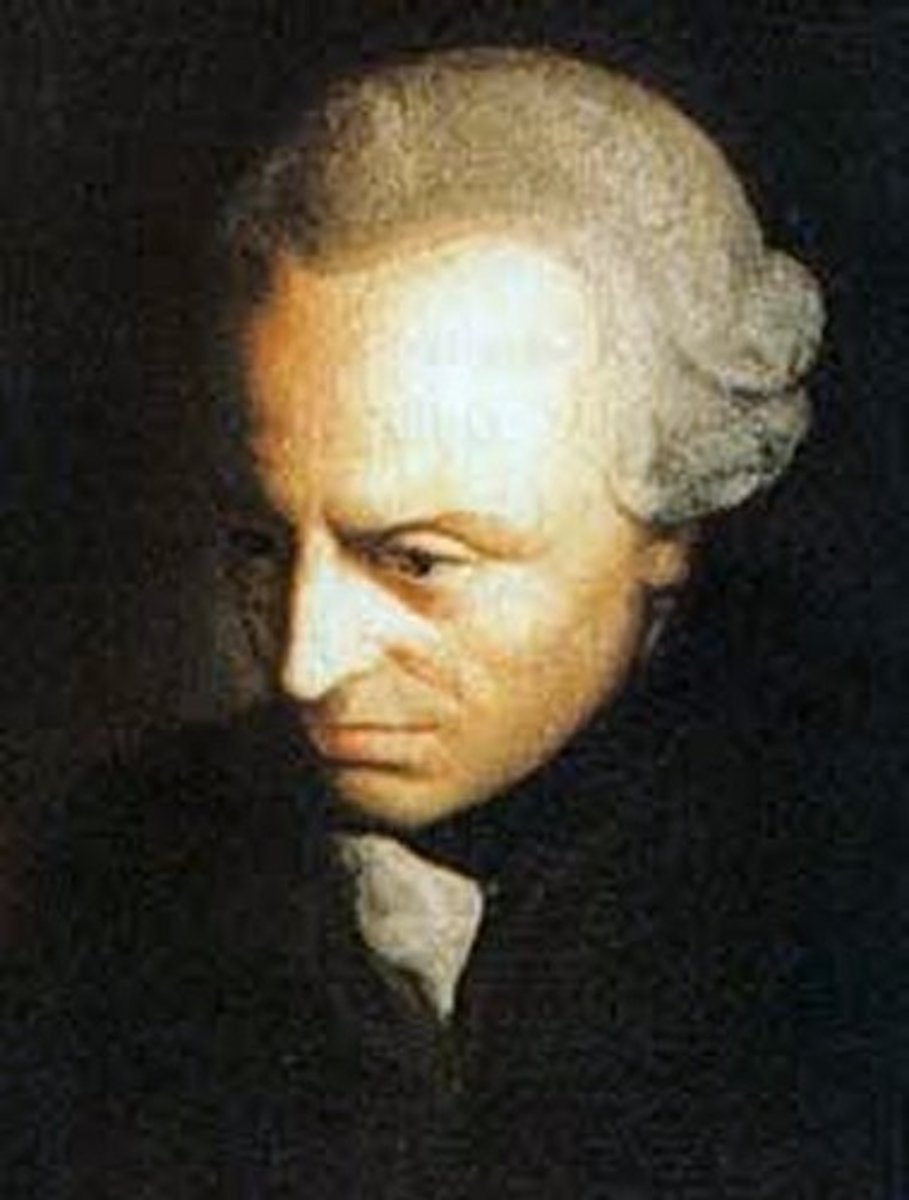Kantian Ethics
1/11
There's no tags or description
Looks like no tags are added yet.
Name | Mastery | Learn | Test | Matching | Spaced | Call with Kai |
|---|
No analytics yet
Send a link to your students to track their progress
12 Terms
Who created the theory and when?
The German philosopher Immanuel Kant in the 18th century

What are they key assumptions of Kant's theory?
- We are autonomous individuals who have free choice and reason
- We discover morality through reason
- There are universal moral laws that are exist a priori and we discover these, we do not create them
- It is both deontological and teleological
Duty, goodwill and maxims
- Kant believes we must follow our duty regardless of the consequences
- He thinks the good will is the only things that is morally good and that a person of good will is not motivated by self interest or anything but duty
- He believes that discovery of the moral law starts with maxims which are subjective moral principles that can be deduced by all rational human beings and developed into moral laws. E.g the law of libel has come from the maxim that lying is wrong
Categorical Imperative
- The Categorical Imperative is Kant's way of finding out whether a maxim is morally right
- It has three tests to test a maxim, these are;
1. The universal law principle
2. The principle of humanity as an end not a means
3. The principle of the universal kingdom of ends
The universal law principle
- 'Act only on that maxim whereby which you can at the same time will that it become a universal law'
- This is the idea that for an action to be moral it must be able to be consistently universalised meaning it would be acceptable in every situation regardless of the consequences
- An example of this is breaking a promise. If everyone broke their promises then no one would believe a promise and the concept would vanish. He calls this a 'contradiction in nature' as the very nature of promising is destroyed and the action becomes self-contradictory
The principle of humanity as an end not a means
- This is the idea that we must not use others in pursuit of an ethical end
- An example of this would be rape being wrong as it involves someone using another person purely for their own pleasure
- He thought it was contradictory to do something that devalues humans while seeking to do something for the good of humankind
The principle of the universal kingdom of ends
- This is where Kant imagines a society of purely rational agents that desire the same good
- This society is what the moral laws are designed to achieve
- A maxim is only acceptable if it pursues this society
Hypothetical Imperative
- These are commands that instead of being compulsory to obey (Categorical Imperative) are ought to be obeyed
- It takes the form of 'if you want X, then you must do Y'
- E.g. If we applied the categorical imperative to 'We can only eliminate poverty by removing debt in poor countries' then the universal principle would state that removing debt in all situations is wrong. The hypothetical imperative covers this by saying 'if we want to eliminate poverty, we ought to drop debts in poor countries'
Summum bonum
- The highest good
- This is the resolution of good and happiness
- He believed a true moral being is both good and happy, and that because this is not always seen in the current life, it will be achieved in the afterlife
Extreme duty
- Duty that is done and rejects happiness as a basis for moral-decision making
- E.g if a fire occurred on a row of houses and you heard someone calling out for help in a nearby house, but your mother was in a further house, Kant would say that preserving life is universal therefore you shouldn't discriminate by going for your mother who is further away
Strengths of Kantian ethics
- It is deontological meaning it doesn't take the consequence of an action into account, which can often be hard to predict
- Emphasises that we are autonomous individuals meaning we have the right to choose
- Eradicates bias (e.g. not helping certain groups of people) when making decisions as the law needs to be universal
Weaknesses
- Consequences are ignored but can often be important, e.g. if a crazy murderer asked you where your best friend was, you would have to tell the truth
- Kant only thinks rational beings have worth making people such as children, or the mentally disabled being seen with no moral worth
- Some duties conflict such as truth telling and preserving life in the previous example. Kant doesn't make it clear which maxim to follow